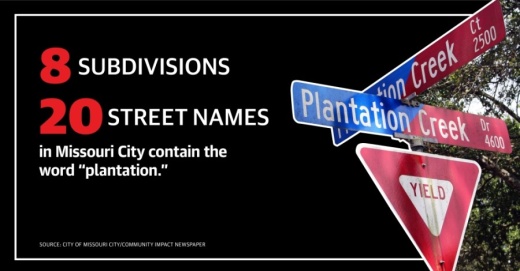In July and August, Missouri City City Council unanimously approved changes to two sections of city code related to the street-naming and renaming process.
Council’s actions come after some street and subdivision names have come under scrutiny from council members and the community for containing the word “plantation” or bearing names of Civil War battles and Confederate generals.
Throughout Missouri City, eight subdivisions and 20 street names include the word “plantation.” The Vicksburg subdivision has also been a focus of council because many streets bear names of Confederate generals who supported and perpetuated slavery.
Mayor Yolanda Ford said these amendments to city code were a priority for her when she was elected to the role in November 2018.
“Glorification or honoring these names with signage or monuments is a constant reminder of the horrific history and painful memories of slavery, murder, torture, rape and much more that African Americans have endured throughout history,” Ford said in an email.
Altering existing street names
One change council made to city code reduced the percentage of signatures required to rename a city street.
Previously, 90% of property owners with land bordering the street to be renamed needed to sign a petition to apply to rename the street.
Council Member Jeffrey Boney, whose district includes the Vicksburg subdivision, proposed the approved change, which lowered the signature amount to 70% of property owners on the street to be renamed.
“We have to keep in mind the climate in which we are in,” Boney said during a July 20 City Council meeting. “Lowering the threshold from 90% to a more modest 70% is something I feel like would help the citizens decide if this is something they would like to undertake."
Missouri City Planning Manager Jennifer Thomas Gomez said developers often choose a theme when naming a neighborhood. For the Vicksburg subdivision, that theme was the Civil War, Gomez said.
The Vicksburg subdivision is divided into three sections, two of which—The Village of Cumberland and the Village of Shiloh—draw inspiration from the Civil War, Gomez said. She added that these areas conceivably represent the Union Army and the Confederate Army, respectively.
Gomez said there are controversial street names in the Village of Shiloh, where street names match those of Confederate generals, including Bedford Forrest Court, which shares a name with Nathan Bedford Forrest, a Confederate general and the first grand wizard of the Ku Klux Klan.
Four residents submitted comments at the Aug. 3 meeting; three expressed being in favor of changing street names to better reflect the diversity found in Missouri City, while one opposed renaming city streets.
Comments from Chris Gilbo, who lives on Confederate Drive in the Vicksburg neighborhood, were read by City Secretary Maria Jackson during the meeting.
“Can you imagine what it feels like for the past 24 years to write this down on paper or to see it on your driver’s license? It’s sickening and insensitive to all races,” Gilbo said in his statement. “This needs to change now.”
David Ball, another resident of the Vicksburg subdivision, said in his submitted comment that he opposed changing street names, in part because of the costs associated with the changes.
Ball went on to question what a name change would mean for postal service, GPS mapping tools and emergency operations.
“There are too many questions and not enough answers for this knee-jerk reaction that has gripped our country,” Ball said. “History cannot be erased, and those who ignore their history are failed to repeat it.”
Missouri City officials said it would cost the applicant about $600 per sign to update a street name. These proposals have to go before council for a vote. In an email, Ford said she would look favorably on applications from Missouri City residents.
New street name guidelines
In addition to lowering the petition threshold to change existing street names, council took another action that Ford said will ensure future streets do not bear racially or historically offensive names.
“It’s appalling that we have streets and neighborhoods in Missouri City with names that represent and honor people, places and events that were notorious for murdering, raping, beating, hanging, enslaving and many other dreadful atrocities to African Americans,” Ford said Aug. 3.
Under the city’s previous standards, there were few regulations related to what builders and developers could name new streets, according to city officials.
Now, new street names can only contain a proper noun if the person or entity “has contributed to the community or humanity” and cannot contain a word or phrase deemed “overused.”
City documents show the intent of prohibiting overused words would limit using “plantation” in future street names, as it is used in at least 20 street names in the city or its extraterritorial jurisdiction. Other retired street names include “green” and “quail,” which appear 34 and 44 times, respectively, according to the city.
Subdivision names will not be governed by these new standards, as they are considered private property.
City officials said the word “plantation” appears in eight different subdivisions in Missouri City, including Sienna Plantation, which recently rebranded to Sienna.
Sienna Marketing Director Allison Bond said plans to rebrand the community began in early 2019.
“The impetus of it was obviously conversation around language and being cognizant of how that could impact people,” Bond said. “That was an important part of the conversation. Another interesting aspect was that the evolution of just becoming Sienna was happening organically.”
The new regulations adopted by council also include provisions that street names should be appropriate; should not promote illegal activity or violence; and should not demean, intimidate or maliciously portray any particular group.
“This is an opportunity to show compassion and kindness rather than to continue to remind the majority of this community of some of the darkest moments in this nation’s history,” Ford said in an email.





